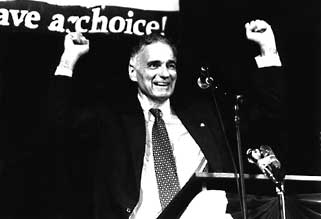
Nader gesticulates at Seattle rally on August 26. The banner behind reads, "You have a choice!" Photo: Susan Fried
go to WASHINGTON FREE PRESS HOME (subscribe, contacts, archives, latest, etc.)
Sept/Oct 2000 issue (#47)

Nader gesticulates at Seattle rally on August 26. The banner behind reads, "You have a choice!" Photo: Susan Fried |
At an August 26 rally at the Labor Temple in Seattle, Green Party presidential candidate Ralph Nader railed against international union officers who have endorsed Democratic candidate Al Gore. "How long," Nader cried out, "oh how long, is organized labor going to be led by the nose by the Democrats?"
Nader is correct that union politics should matter to the American public. Unions are the ideal place for workers to organize for their political interests. Furthermore, when workers can make changes through the democratic process ITAL inside their unions, they are more likely to turn enthusiastically toward conventional politics. Unions can turn around voter apathy.
In today's labor unions there are no political parties. Rank-and-file caucuses, weak sisters to real political parties, are often labeled as disloyal. Without competing political parties, union officers rarely face opposition candidates. Most top-level "international" union officers are unanimously re-elected by delegates whose fortunes are heavily dependent on these incumbents. International union elections resemble the Mexican elections that have been dominated for 70 years by the Institutional Revolutionary Party. Incumbents handpick their successors, and the only real political party is the State. Unions are governed as one-party states.
Nader accuses the Democrats of joining the Republicans in one corporate political party. The corporate media has created this giant corporate party, exclaimed Nader. When the media speaks with one voice, political debate is stifled. The corporate media "decides who says what and who doesn't say what."
In a like manner, all communications media within labor unions also speak with one voice. Magazines and newspapers are propaganda organs for the incumbent officers. Without a free press in unions, elections of union officers are sham elections.
Nader reminded the audience at the Labor Temple that national union membership in the private sector has fallen below ten per cent of the workforce. With the decline of labor unions, he explained, has come a decline in the fortunes of the American worker. Real wages have fallen since 1973. The minimum wage, adjusted for inflation since 1970, should be nearly $8 an hour. Furthermore, Nader accused both Democrats and Republicans of failing to protect the health and welfare of workers. More coal miners have died from mining-related diseases and collapsed mines, exclaimed Nader, than all the casualties of World War II. Americans die from occupational hazards at a rate five times the rate of homicides.
Nader blamed the declining fortunes of the American worker on the stranglehold by the corporations on both national politics and on the media. In a similar fashion, union officers often have a stranglehold on labor unions that rightfully belong to the working public. The Center for Democratic Unions believes that this stranglehold on unions is at the root of the corporate domination of national politics. Labor is supposed to provide a counterweight to the corporate interests. However, without competitive democratic elections union officers will remain incapable of effective leadership. Labor will continue to decline.
Nader expressed dismay that international union leaders endorsed Al Gore even though Gore had vigorously campaigned for NAFTA over the objections of these same union officers. "How long will labor leaders be led by the nose," Nader asked? Until alternate strategies can emerge from vigorous internal debate and competitive elections inside unions, nothing is likely to change. For change to happen, unions need legitimate internal organized political parties.
Ralph Nader has an opportunity to help the American public understand how the lack of democracy in unions has put a stranglehold on American working families. The American public must demand that unions provide direct democratic elections, organized internal political parties, and a free press within the union. While the Center for Democratic Unions applauds Mr. Nader's courageous stand for the repeal of the Taft-Hartley Act and for other legislative reforms that would strengthen labor unions, he needs to go further. Nader can help lead the way toward true democratic unions. Then local labor unions can heed Nader's call for them to lead the way in the democratization of the American political process.
The Center for Democratic Unions can be reached at cdu@igc.org.
|
go to WASHINGTON FREE PRESS HOME |